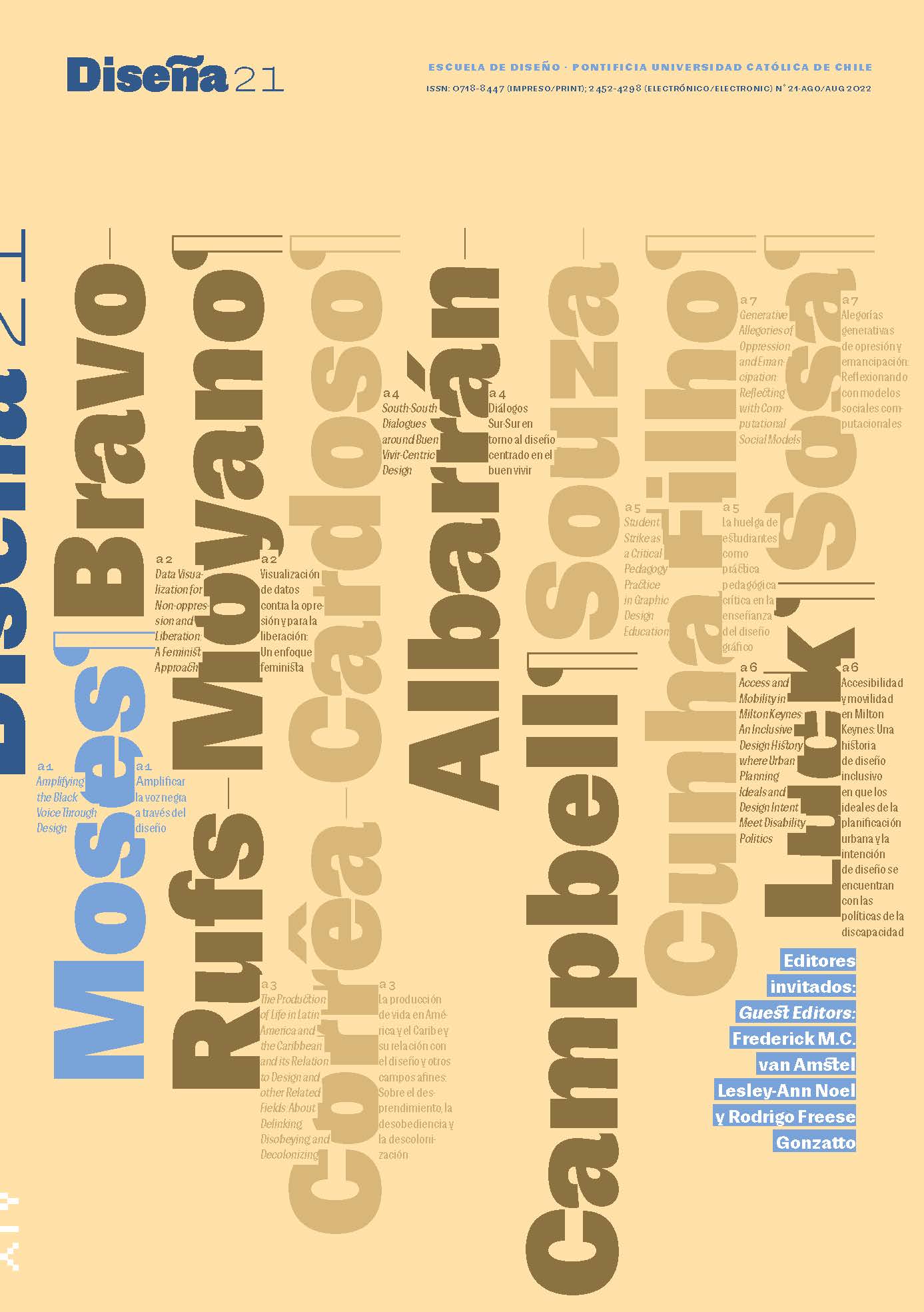Diseño, opresión y liberación
Contenido principal del artículo
Resumen
El papel del diseño en la estructuración de la opresión ha sido en gran medida desconocido por la investigación y la historia del diseño. Sin embargo, podemos ver un movimiento reciente, impulsado por los movimientos sociales, que reconoce la complicidad del diseño con diversas formas de opresión. Reconocer el diseño opresivo abre la posibilidad de ocupar, reclamar, reparar y restaurar lo que los opresores han hecho con él. Algunos de los enfoques que hacen que la investigación en diseño pase de la denuncia al anuncio de nuevas realidades. De no hacerlo, podría prevalecer el fatalismo, aun siendo crítico con la realidad actual. En el caso del diseño, esto significa dedicar el mismo esfuerzo a analizar los diseños opresivos que a desarrollar diseños liberadores. En sintonía con esta implicación, este número especial destaca las investigaciones que contribuyen tanto a agudizar la comprensión de la opresión en el diseño como a aumentar la solidaridad entre las distintas luchas por la liberación que atraviesan el diseño.
Descargas
Detalles del artículo

Esta obra está bajo una licencia internacional Creative Commons Atribución-CompartirIgual 4.0.

Este obra está bajo una licencia de Creative Commons Reconocimiento-CompartirIgual 4.0 Internacional.
NOTA DE COPYRIGHT
Todos los contenidos de esta edición electrónica se distribuyen bajo licencia Creative Commons de “Atribución-Copartirigual 4.0 Internacional” (CC-BY-SA). Cualquier reproducción total o parcial del material deberá citar su procedencia.
Los derechos de las imágenes publicadas pertenecen a sus autores, quienes otorgan a Diseña la licencia para su uso. La gestión de los permisos y la autorización de publicación de las imágenes (o de cualquier material) que contenga derechos de autor y sus consecuentes derechos de reproducción en esta publicación es de exclusiva responsabilidad de los autores de los artículos.
Citas
Angelon, R., & van Amstel, F. (2021). Monster Aesthetics as an Expression of Decolonizing the Design Body. Art, Design & Communication in Higher Education, 20(1), 83–102. https://doi.org/10.1386/adch_00031_1
Bardzell, S. (2010). Feminist HCI: Taking Stock and Outlining an Agenda for Design. Proceedings of the SIGCHI Conference on Human Factors in Computing Systems, 1301–1310. https://doi.org/10.1145/1753326.1753521
Costanza-Chock, S. (2018). Design Justice: Towards an Intersectional Feminist Framework for Design Theory and Practice. Proceedings of the Design Research Society 2018. https://papers.ssrn.com/sol3/papers.cfm?abstract_id=3189696
Fanon, F. (2007). The Wretched of the Earth. Grove.
Freire, P. (1984). A máquina está a serviço de quem? Revista BITS, 1(7), 6.
Freire, P. (1996). Pedagogy of the Oppressed. Continuum.
Freire, P. (2000). Pedagogia da indignação. UNESP.
Gonzatto, R. F., & van Amstel, F. (2022). User Oppression in Human-Computer Interaction: A Dialectical-existential Perspective. Aslib Journal of Information Management, (ahead-of-print). https://doi.org/10.1108/AJIM-08-2021-0233
Grosfoguel, R. (2020). Pensamiento descolonial afro-caribeño: Una breve introducción. Tabula Rasa, (35), 11–33. https://doi.org/10.25058/20112742.n35.01
Gutiérrez Borrero, A. (2015). Resurgimientos: Sures como diseños y diseños otros. Nómadas, (43), 113–129.
hooks, bell. (2014). Teaching to Transgress. Routledge.
Jack, M., & Tuli, A. (2021). Designing for Liberation: Our Lives, Mobility, and Technology. Interactions, 28(2), 34–41. https://doi.org/10.1145/3448020
Liao, S., & Huebner, B. (2021). Oppressive Things. Philosophy and Phenomenological Research, 103(1), 92–113. https://doi.org/10.1111/phpr.12701
Noel, L.-A. (2020). Envisioning a Pluriversal Design Education. In R. M. Leitão, L.-A. Noel, & L. Murphy (Eds.), Proceedings of PIVOT 2020: Designing a World of Many Centers, DRS Pluriversal Design SIG Conference (pp. 69–77). https://doi.org/10.21606/pluriversal.2020.021
Passos, L. A. (2010). Trama. In D. R. Streck, E. Redin, & J. J. Zitkoski (Eds.), Dicionário Paulo Freire (pp. 406–407). Autêntica Editora.
Reynolds-Cuéllar, P., Grisales, C., Wong-Villacrés, M., Serpa, B., Goñi, J. I., & Lemus, O. A. (2022). Reviews Gone South: A Subversive Experiment on Participatory Design Canons: Dedicated to the Memory of Oscar A. Lemus. Proceedings of the Participatory Design Conference 2022 - Volume 1, 206–217. https://doi.org/10.1145/3536169.3537794
Santos, M. R. dos. (2018). Gênero e cultura material: A dimensão política dos artefatos cotidianos. Revista Estudos Feministas, 26. https://doi.org/10.1590/1806-9584.2018v26n137361
Schultz, T., Abdulla, D., Ansari, A., Canlı, E., Keshavarz, M., Kiem, M., Martins, L. P. de O., & J.S. Vieira de Oliveira, P. (2018). What Is at Stake with Decolonizing Design? A Roundtable. Design and Culture, 10(1), 81–101. https://doi.org/10.1080/17547075.2018.1434368
Souza, O. (2020). Racist Motifs in Design. In R. M. Leitão, L.-A. Noel, & L. Murphy (Eds.), Proceedings of PIVOT 2020: Designing a World of Many Centers, DRS Pluriversal Design SIG Conference. https://doi.org/10.21606/pluriversal.2020.013
van Amstel, F., & Gonzatto, R. F. (2020). The Anthropophagic Studio: Towards a Critical Pedagogy for Interaction Design. Digital Creativity, 31(4), 259–283. https://doi.org/10.1080/14626268.2020.1802295
Vieira Pinto, Á. (1993). Sete lições sobre educação de adultos. Cortez.
Westerlaken, M. (2020). What is the Opposite of Speciesism? On Relational Care Ethics and Illustrating Multi-Species-isms. International Journal of Sociology and Social Policy, 41(3/4), 522–540. https://doi.org/10.1108/IJSSP-09-2019-0176

